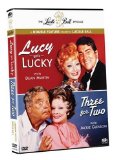| Reviews & Columns |
|
Reviews DVD TV on DVD Blu-ray 4K UHD International DVDs In Theaters Reviews by Studio Video Games Features Collector Series DVDs Easter Egg Database Interviews DVD Talk Radio Feature Articles Columns Anime Talk DVD Savant Horror DVDs The M.O.D. Squad Art House HD Talk Silent DVD
|
DVD Talk Forum |
|
|
| Resources |
|
DVD Price Search Customer Service #'s RCE Info Links |
|
Columns
|
|
|
Lucille Ball Specials: Lucy Gets Lucky & Three for Two, The
Not everything was better back in the good old days of television. MPI, under their The Lucille Ball Specials banner, has released a double feature of Balls' mid-70s one-off TV specials for CBS - Lucy Gets Lucky and Three for Two - co-starring two other giants of the medium, Dean Martin and Jackie Gleason. Fans of Ball (and I count myself one, too, as well as for the sublime Martin and Gleason) have been clamoring for these to come out on disc for years - I certainly was excited at the prospect of seeing them again. And while I'm all for releasing TV specials on DVD (a genre that's been criminally underrepresented on DVD), no amount of love for these performers, nor nostalgia for those long-gone TV times (nobody remembers those times as fondly as I do), can alter the fact that Lucy Gets Lucky isn't particularly funny, and the comedy/drama anthology Three for Two isn't particularly comedic or dramatic. Some interesting extras do help The Lucille Ball Specials: Lucy Gets Lucky & Three for Two a bit, though.
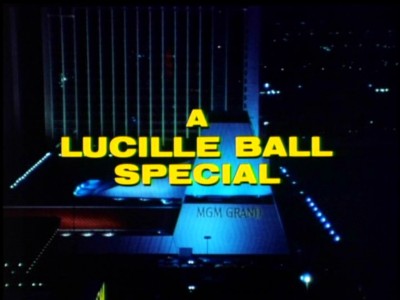
I'm not sure I can add anything new to any kind of evaluation of Lucille Ball. The phrase, "comedic genius," is often used to describe her, and if that term has any kind of validity or worth anymore (from overuse), she's certainly as deserving of it as anyone else I can think of (Gleason, of course, too). I know just as an average viewer that I can turn on any random episode of the original I Love Lucy and she'll make me laugh, each and every time (Desi, as well). The only other performer I can think of who matches that reliability is Gleason in The Honeymooners. From all reports about Lucille Ball, she wasn't an "on" comedian by any means off the camera; apparently, she was quite serious about her comedy, and only came "on" when she was performing or entertaining friends. If that's true, it makes her performances on I Love Lucy all the more notable because on camera at least, she has that "X" factor of inherent humorousness that you can't teach, and you can't fake. Quite simply, everything she does is imbued with a comedic lilt that makes even the most prosaic line or bit of business delightfully anticipatory of more fun to come. I do think that quality flourished and peaked with the original I Love Lucy. I can't say why that was (if she had agreed with that theory, I suspect she might have admitted that Desi had a whole lot to do with it), but I do know her subsequent situations, her slapstick set-ups, and her dialogue in later shows weren't as funny as they were in I Love Lucy. Prior to these network specials, Lucy's last series for CBS, Here's Lucy, had finished a highly successful six-year run. She still got laughs, and plenty of them, but it somehow wasn't the same. The effortlessness of her art was gone. She was really working for the laughs, now. It seemed somewhat desperate, in a way (she didn't look like she was having any fun). I know as a fan of hers, I didn't particularly enjoy Here's Lucy as a kid; if I had had the options that DVD provides today, I would certainly have opted to watch an old I Love Lucy episode over something newer like Here's Lucy (and it didn't get better as Lucy aged; her ABC sitcom from 1986, Life With Lucy, was unwatchable).
LUCY GETS LUCKY
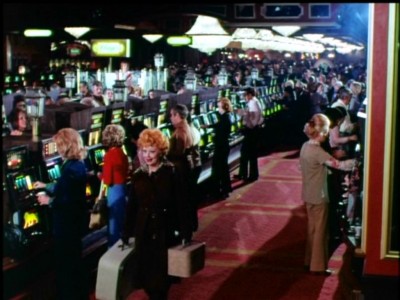
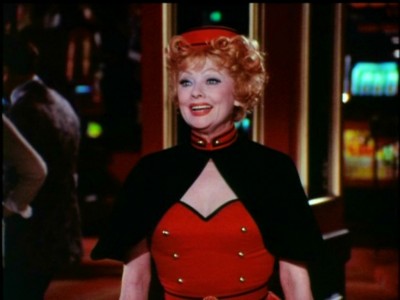
Unfortunately, that harsh, strident striving for laughs is present in the first special presented here, Lucy Gets Lucky, which was directed by old pro Jack Donohue (who saves the film's best gag for himself, when he tips Lucy more for driving off his mother-in-law), and which premiered on March 1, 1975. Ratings weren't quite what they used to be for Ball in the final season of Here's Lucy, but they were still substantial enough for Ball to negotiate with CBS and various sponsors (Timex sponsored Lucy Gets Lucky) to produce a series of one-off television specials where Lucy could work in a longer format (as well, the thought in the industry at the time was that Lucy was an undeniable "fact" with audiences; they would love her in anything for as long as she continued to work). The idea behind this first special certainly seemed promising enough within the standard "whacky Lucy" formula (if a bit thin for a 90 minute special). Lucy plays Lucy Collins, who gets off the bus from Los Angeles to see Dean Martin's new show at the MGM Grand. Stopping in to say hi to her friend, Gladys (Vanda Barra), who owns a small hotel out behind the Grand (when there was still desert out behind the Grand), Lucy tells Gladys that she's only able to see the show because she lied when she called for reservations: she said it was for a party of eight. Gladys tells her she'll never get a seat now, but she doesn't know our Lucy, who first tries to b.s. her way in with major domo Antonio (Gino Conforti). When that doesn't work, she goes right to the source: old Dino himself. After meeting Dean in the coffee shop, Lucy hatches a plan to work at the casino; that way, she'll be able to see Dean's special 3:00am show he's putting on just for the employees at the Grand. And of course, hilarity ensues. Lucy can't seem to do any job right, even when her boss, Gus Mitchell (Jackie Coogan), continues to keep her on because of "women's lib pressure." Eventually, though, Lucy's constant screw-ups trump the threat of a lawsuit for Gus, but every time he goes to fire her, Dino magically appears and squares the deal. Will Lucy get to see Dino perform? What do you think.
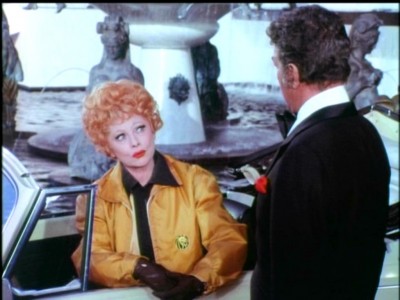
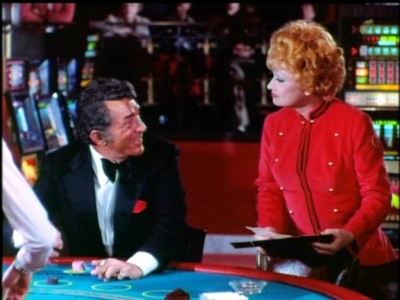
As they say, "timing in everything," particularly comedy, and with Lucy Gets Lucky, that timing is just off. There's a dead-air feel to the special that isn't helped by the static way it's shot. Lucy's normal method of shooting on her shows was to have that camera pull back and let the action roll, so the audience could see the performer and the performance in its entirety. But in Lucy Gets Lucky, most of the shots with Lucy and Dino are broken up into tight close-ups, reducing the comedy to a series of flat back-and-forth one-liners, and making it all the more apparent that both stars are heavily relying on cue-cards (you always forget how distracting this practice was back in the 70s specials). Not helping either is the lack of a laugh track. Now I know it's verboten to claim affection for the dreaded laugh track (a recent criticism that seems largely employed to denote snobbery), but there's no denying that the delighted screams of the live audiences during the original I Love Lucy episodes - even if they were "sweetened" - were a big part of the delight the audience at home experienced when they watched the show (I don't see anyone complaining about Seinfeld's laugh track). And Lucy Gets Lucky, desperate for any kind of lift, sure could have used that laugh track. Plain and simple, Lucy Gets Lucky just isn't funny enough to raise more than a smile or snicker now and then - and those mostly come as a result of bored, weary Dino, who is genetically incapable of not being funny in almost anything he does. Watch closely, and you'll see that Dino's very first appearance on screen shows him almost impercepitively belching under his breath; that's how relaxed (or contemptuous?) he is here. And there's no denying that when he gets a chance to interact with Lucy, minus the restrictive close-ups and the darting eyes to the cue cards, he and Lucy get some laughs (the physical gag with Dino superstituously circling his chair at the gambling table is probably the film's best bit, and most of it is due to Dino's expert reaction shots).
But too much of Lucy Gets Lucky's comedy is as tired as Lucy looks here. It's almost like a Martin and Lewis vehicle, with Lucy as Jerry, mugging and scrambling for laughs in material that isn't worthy of the comedian's talents. All the set-ups are as old as the hills (Lucy in Indian garb; Lucy mistaking toy makers for gangsters; Lucy wearing a monster mask and leading a slow, slow chase in a miniature car around the vast M-G-M Grand), and the film finally grinds to a halt, unable to resolve its plot, and ends up with Dino singing Everybody Loves Somebody and Tie a Yellow Ribbon (Round the Old Oak Tree). It's great seeing Dino do a little bit of his nightclub act, and it's also rather sweet to see him dancing with Lucy at the end, a genuine smile of delight on his face as he moves her smoothly around the dance floor. But it's a long, long haul to this nice moment (filled out with plenty of advertising shots for the Grand), one that could have been much more amusing.
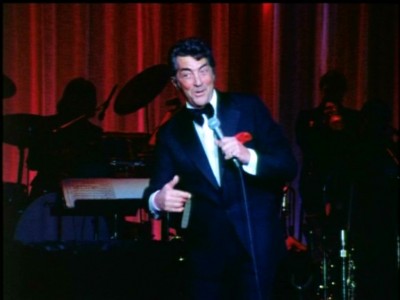
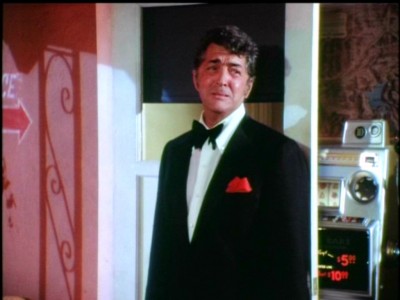
THREE FOR TWO
The next special, Three for Two (which was originally broadcast in December of 1975 as A Lucille Ball Special Starring Lucille Ball and Jackie Gleason - that title card is included here), directed by veteran helmer Charles Walters, is even more dire. Although inspired by stories written by that marvelous team of Joseph Bologna and Renee Taylor (Lovers and Other Strangers, Made For Each Other), the final writing credit for this trio of serio-comic vignettes is James Eppy, and perhaps that's where the problem ultimately lies for Three for Two. How many of Bologna's and Taylor's lines made it through to the final script? It's hard to say, but more importantly, how much different would Three for Two had been had those two performers enacted these short pieces, rather than Ball and Gleason? It's not that either performer lacks the actor skills necessary to pull off these essentially dramatic pieces (Gleason in particular was a vastly underrated, underutilized dramatic actor), it's just that the writing and performances are...off, and you can check off "age," or "career arc" or "middling script" or "uninspired direction" or any other number of factors that contributed to Three for Two coming off so badly in design and execution.
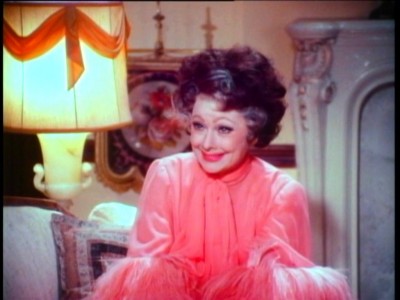
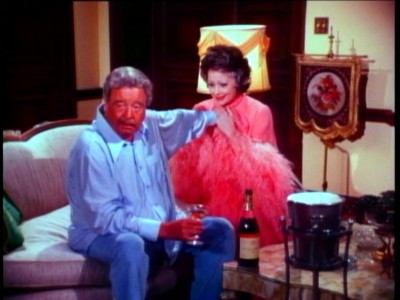
In the first vignette, Lucy plays Sally, a bored housewife who finally sees her trip to Rome as a chance to reconnect romantically with her preoccupied businessman husband, Herb, played by Gleason. As the two trade subpar Neil Simon ripostes about long, loveless marriages and neglectful businessmen husbands, Lucy again keeps one eye on the cuecards as Gleason unattractively gets madder and madder, finally resorting to his Peter Lorre imitation (funny, but a little too Mel Blanc-y). In the middle playlette, Lucy plays Rita, looking for her lover Fred (Gleason, obviously) in a supposedly comically ill-lit, almost completely dark restaurant. As the two trade subpar Neil Simon quips about the comic possibilities of two married people having an affair, the little playlet ends before it even begins, making it seem rather like one of those linking black-out sketches on Love, American Style. Finally, married couple Mike and Pauline (yes, Ball and Gleason), try to guilt their grown kids into staying home on New Year's Eve, before they sadly conclude, a la Neil Simon, that they're getting older in a sometimes shaky marriage, with the film's final shot showing them sitting there alone in their house, depressed, as Guy Lombardo comes on the tube.
Yes, Three for Two is that dire. It's bad enough that the script doesn't have any truly funny lines, while the dramatics are as creakily familiar as the umpteenth TV showing of Simon's Chapter Two, Same Time Next Year, Plaza Suite, or any other of a dozen far more superior Simon plays that Three for Two openly apes. And no help can be found from predictably square Walters, either (his tired blocking and direction, if it can even be called that, is entirely suited to TV). The real problem in Three for Two are the leads. With Lucy, a most curious thing happens by the time this second special comes up on the disc. Having watched her essay her typically wacky "Lucy" persona in Lucy Gets Lucky, we're now treated to the more "dramatic" Lucy, and one would think we'd welcome the departure, particularly when Ball was so good in those kinds of roles, when handled properly. But bizarrely, we can't take her seriously here because we keep expecting zany antics (particularly when paired with the soon-to-explode Gleason), even when we don't want her to be madcap and crazy. Perhaps because the serio-comic dramatics are so weak to begin with, we hope she'll break loose from the confines of the script and invent some kind of business to get us laughing again. But no such luck; instead, we're stuck with a thoroughly ennervated Lucy who seems uncomfortable not only with the sleepy dialogue, but also impatient with her angry co-star. As for him, any of the inherent charm and little-boy-lost quality that Gleason could effortlessly conjure up for Ralph Kramden (a quality that immediately emeliorated Ralph's blowhard personality), is long gone here, with Gleason alternately visibly bored (watch him roll his eyes at several points in the film) or noticeably ticked-off. Career resurrection for Gleason would have to wait two more years when Burt Reynolds saved him from relative obscurity with Smokey and the Bandit, but clearly at this point, Gleason's participation in Three for Two falls far short of the sort of magical pairing one might expect from the coming together of these two giants of the industry. It's a particularly sad offering from the two, showing each performer in less-than-flattering light (due to improper handling by the weak director), in tepid little playlettes unworthy, ulitmately, of their talents.
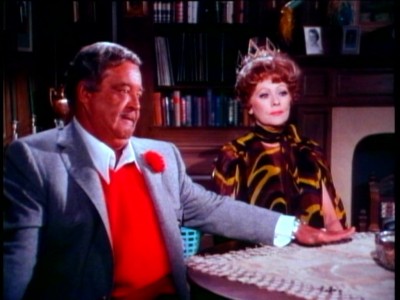

The DVD:
The Video:
Considering the age and relative obscurity of these two specials from the 1970s, the full-screen, 1.33:1 transfers for The Lucille Ball Specials: Lucy Gets Lucky & Three for Two look quite nice. Shot on film, the source materials used for these transfers look quite clean, with minimal damage and correct color (for the most part). The image, however, can be soft at times; however, I noticed no compression issues (potentially a factor with both specials on one disc). Overall, these probably look better than they did coming over most folks TV antennas back in 1975.
The Audio:
The Dolby Digital English mono audio is split on two channels, with acceptable loudness levels and no distortion to speak of - all dialogue is heard cleanly here. No close-captions or subtitles are provided, unfortunately.
The Extras:
Some interesting extras do help considerably here with The Lucille Ball Specials: Lucy Gets Lucky & Three for Two. First up is a black and white clip from Art Linkletter's long-running daytime variety show, House Party (when is someone going to get some of those out on DVD?), where Lucy shows up to discuss her new radio series, Lets Talk to Lucy, before Lucy and Art enact a comedy sketch where Lucy produces some wacky sound effects for a radio program. It's from 1965, and the clip runs 10:51. Next up are two "visually enhanced" episodes from Lucy's Let's Talk to Lucy radio series (I had never heard of this series before), where stills, expertly produced, are animated over the radio programs' audio track. First up is Episode #5, from 1964, where guest Dean Martin discusses a variety of projects he has coming up, including his smash single, Everybody Loves Somebody, Kiss Me, Stupid, and Robin and the 7 Hoods. I love it when Martin dismisses in one fell swoop all past and future "tortured artists" of the screen with his calm assertion that, "An actor's job is the easiest in the world." And he means it. Amen, Dino. Amen. This clip runs 11:29. Next, Lucy visits Dean again on the set of Marriage on the Rocks (yikes!), in Episode #195 of her radio series, where Dean again smoothly discusses his career (listen to him merely "humph" when Jerry Lewis is mentioned by Lucy, who quickly moves on). This clip runs 9:03 (hey, MPI: let's see a whole disc of these Let's Talk to Lucy audio clips, animated in this fashion. They're fascinating). Next, we have a featurette with the marvelous comedic actor Gino Conforti discussing his long association with Lucy. We even get to see a snippet of Lucy's first and only credited directorial effort (according to Conforti): the unsold pilot for Bungle Abbey, which co-starred Conforti. Conforti is effusive in his praise for Ball, and he has some fascinating insights into the actress. The featurette runs 14:09. Finally, we have some outtakes and bloopers from Lucy Gets Lucky that run 5:42 (they're not that funny, either).
Final Thoughts:
The Lucille Ball Specials: Lucy Gets Lucky & Three for Two is a tough disc to grade because even though the individual TV specials aren't that "special," the historical value is there, particularly for fans of the three performers featured here. MPI helps out a lot by including some interesting extras - although this only complicates the disc's final evaluation. I'm going to just barely recommend The Lucille Ball Specials: Lucy Gets Lucky & Three for Two - and that's only for die-hard fans of Lucille Ball, Dean Martin, and Jackie Gleason, warning them full-on that these specials don't show their idols in the best light. MPI's extras here are big push forward for this recommendation, so casual viewers who aren't emotionally invested in either these performers or this genre of 1970s one-off TV specials, should steer clear of the The Lucille Ball Specials: Lucy Gets Lucky & Three for Two disc.
Paul Mavis is an internationally published film and television historian, a member of the Online Film Critics Society, and the author of The Espionage Filmography.


|
| Popular Reviews |
| Sponsored Links |
|
|
| Sponsored Links |
|
|
| Release List | Reviews | Shop | Newsletter | Forum | DVD Giveaways | Blu-Ray | Advertise |
|
Copyright 2024 DVDTalk.com All Rights Reserved. Legal Info, Privacy Policy, Terms of Use,
Manage Preferences,
Your Privacy Choices | |||||||









